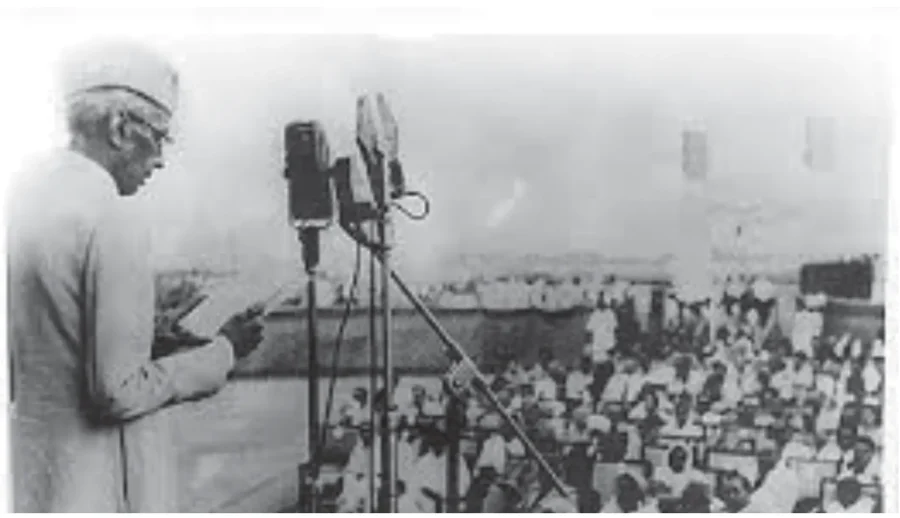Dawn of 20 th century in south Asia, saw the period of decolonization process that had started after the establishment of INC (Indian National Congress), which created a sense of democracy for the Indian local masses and it provided the platform for the future democrats who had to fight democratically against their British Lords. South Asia saw many leaders who worked day and night for the freedom of people of sub- continent, like Gandhi, Nehru, Molana Abu kalam Azad, subash Chander Bose, but no one got appraisal as much as Quaid e Azam got. In giving tribute to Jinnah, British politician and author John Biggs Davison said “Although without Gandhi, Hindustan would still have gained independence and without Lenin and Mao, Russia and China would still have endured communist revolution, without Jinnah there would have been no Pakistan in 1947”. Indian poetess and freedom fighter Saroijini Naidu, called Jinnah as an ambassador of Hindu Muslim Unity. Sir Agha Khan 3 rd said of Jinnah “of all statesmen that I have known in my life—-Clemenceau, Lloyd George, Churchill, Curzon, Mussolini, and Mahatma Gandhi- Jinnah is the most remarkable. None of these men in my view outshone him in strength of character and in that almost uncanny combination of prescience and resolution which is statecraft.” American author Stanley wolpert, whose ‘Jinnah of Pakistan’ is a classic on the Quaid’s life, wrote of him, “few individuals significantly alter the course of history. Fewer still modify the map of the world. Hardly anyone can be credited with creating a nation state.” Muhammad Ali Jinnah did all three. These views clearly gives us illustrations regarding the political figure of Quaid e Azam Muhammad Ali Jinnah.
Jinnah the main force Behind Lucknow pact of 1916
Lucknow pact of 1916, is one of the biggest achievements of Muslim League, which created trust between leadership of both Congress and Muslim League as well. Mr. Jinnah who was member of both of the parties at a time, He using his influence over both parties, tried to bring both the parties closer, and share common interest against British Government, and act together to get rid of British government, and for the first and final time both Muslim league and congress assembled, the credit of Lucknow pact goes totally to Quaid e Azam, who at the young age showed his guts and proved himself to be a greater leader for the Muslims and world saw it.
Quaid E Azam and 14 points of 9 March 1929:
When there was the constitutional crisis and both British government and Indian National congress failed to give the constitutional fully accepted by all communities of the Sub continent as Simon commission was rejected by both Congress and Muslim league, and in response to Simon Commission, Mr. Moti Lal Nehru presented his Nehru report, which was also rejected as it was against the interest of not only Muslims of sub- continent but also other communities of the colonial India. Then it was Mr. Jinnah who once again had to work to overcome the constitutional crisis of India that time and he presented his outstanding 14 points of 1929, which is still considered as one of the basic/ founding steps In the making of Pakistan, and which clearly gave all the stake holders of India a clear vision of future constitution and no constitution was to be made if its any provision was to be against the 14 points given by Quaid E Azam, which also included the separation of Sindh from Bombay Presidency which was a great achievement of Muslim League and this time again, it was Muhammad Ali Jinnah, who created a path for Muslim League again, and everyone else failed in giving a clear vision for the constitution under such critical time period of India.
Quaid E Azam and Round table conference:
When Britishers and Indian leadership failed on consensus of future constitution of India, Jinnah emphasized strictly that no constitution would be acceptable to the Muslims of India if it did not provide/ guard the fundamental rights of India and that constitution would be accepted if it clearly gave the fundamental and due rights to Muslims of sub-continent, and due to Jinnah’s strong stance Muslim league totally backed and trusted Muhammad Ali Jinnah and Britishers and Congress both realized the demands of Muhammad Ali Jinnah, whose every word was agreed by Muslim League, and none in Muslim League doubted the leadership of Muhammad Ali Jinnah.
Quaid e Azam and congress Ministries:
Quaid convinced Muslim League to help congress in ruling the country, to end the turmoil and political crisis and bring stability to Indian governance. But when congress opted hostile policies towards Indian Muslim which included replacement of Muslim Nationalism with Indian Nationalism, Hindi to replace Urdu, and slogans like Bande Matram and congress’s educational policies which were totally against Muslim sentiments. Jinnah during that time stood against the atrocities committed by Congress, and suggested Muslim league and Muslims to have patience and when congress resigned, Jinnah called Muslim league to celebrate day of deliverance as Muslims finally got freedom from the legal wars initiated by Congress.
Jinnah and divide and quit India movement:
When it was seen that British would leave India sooner or later, Gandhi called for quit India movement, in response to it Mr. Jinnah started “divide and quit India movement” as he stressed upon British government to partition the sub-continent in two states.
Conclusion:
If we say that Mr. Jinnah was the sole person behind the creation of Pakistan, then it would not be wrong to say his skillful leadership provided a independent homeland to Muslims of sub-continent, and if he would not have struggled then Muslims of India would have lost their religious identity which made them unique and different from rest of the communities of India.








